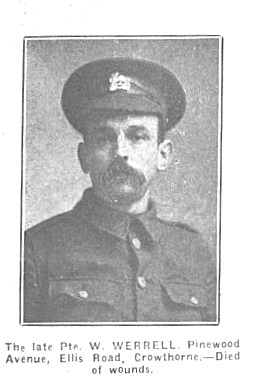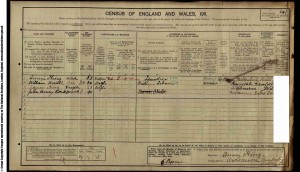 William Werrell. Died 18 October 1917
William Werrell. Died 18 October 1917
Born in 1880, William was to have a difficult childhood, with his father dead by the time he was twelve and his mother remarried into the West family and with it a number of step family and half family. Working as a bricklayers labourer by 1911, he was now 30 years old and single. We do not know when William joined the army and the final time he appears in the record books is on the 8th October 1917, the date of his death. Following the Somme, the 1/4 battalion of the Royal Berks then continued onto Vimy Ridge and Passchendaele in 1917, before moving on to Italy. William is buried just to the west of Ypres and he was killed in what is known as the Third Battle of Ypres (Passchendaele).
The excellent website www.purley.eu describes the confusion of the level of fighting on the days around the 8th October:
‘According to Cruttwell the battalion were not engaged:-
The 144th Brigade attacked again on the 8th-9th October, under the worst possible conditions; our battalion, in Divisional Reserve was allotted to the Brigade and lay out scattered by companies until dusk on the 9th ready to repel counter-attacks and to lend help as required but was not actively engaged. [TX00616]
However, according to an unnamed sergeant giving his recollections to the Berkshire Chronicle, published 14/12/1917 they were indeed very actively engaged:-
“On Oct 10 they took part in what is known as the third battle of Ypres. The battalion had previously crossed a canal and had consolidated about a couple of hundred yards on the other side and their objective was a little piece of ridge on the right of – [St Julien?]. To accomplish their task they had to cover a distance of between 600 and 700 yards and to the great credit of the braveBerkshire lads and to the —[] who were fighting with them they succeeded in achieving this end after about a couple of hours fighting. We launched the attack ay daybreak and three of our companies went over. We had to fight our way up a gradual slope and studded all over the place are shell holes. Abandoning the old trench system which we could knock to pieces with artillery, the enemy has built a large number of concrete houses, commonly known as pillboxes. These little garrisons were mostly composed of machine gunners and specially picked men and one can easily guess how strongly fortified is the Boches’ ground. These blockhouses proved formidable things – hard nuts to crack, but for all that the Berks sewpt past a whole system of blockhouses in a manner calling for the highest praise. The Berks achievement is rendered all the more creditable owing to the fearful conditions under which we had to fight. The weather had tuirned bad again and it is a remarkable fact that the division always clicks terrible weather whenever it goes into action. In places one was up to the neck in mud so to speak and of course such conditions are a great handicap to the boys. Many fell into shell holes and had to grope their way forward blindly in a wild downpour of rain and there were several instances where we had to lug one another out. But the lads did not allow all this to damp their spirits, which were wonderful and which stood them in such excellent stead and it is very gratifying indeed to know that our casualties were somewhat slight, A Company in particular escaping lightly. Four or five blockhouses fell into our hands but we had to fight desperately to capture them. The Huns always hang onto them very strongly. The capture of these pill boxes is of enormous importance to us as they enable us to mount our guns on them and so get an elevation over our infantry. Many, owing to the state of the ground, were flooded. Having taken the portion of the ridge we consolidated the position to the best of our ability, but this is a rotten job, owing to the mud and water. Frequently water could be seen oozing out of the dug outs. It is difficult to know how many prisoners were were taken but I know we captured quite a lot, many surrendering. Sergt Holloway [200010 William Charles Holloway] was killed by a shell which also mortally wounded another who was standing by his side ‘Skinner’ Kinchen [200916 Henry Kinchin] who had been twice wounded in previous engagements also lost his life as did Lance Cpl Brooks [200137 Arthur Charles Brooks]. Both of these had been with us some time. For the interest of Readingites I may mention that Sergt Martin [200620 Stanley Martin], son of Mr Martin of Hatherley Road, is now acting company sergeant major in succession to Sergt Major Heath [201108 Walter Henry Heath].’
[iframe_loader width=”625″ height=”550″ frameborder = “1” longdesc=’ ‘marginheight=’0′ marginwidth=’0′ name=’ ‘click_words=’ ‘click_url=’ scrolling=’yes’ src=’http://wokinghamremembersco.ipage.com/Family trees/Werrell William’]

